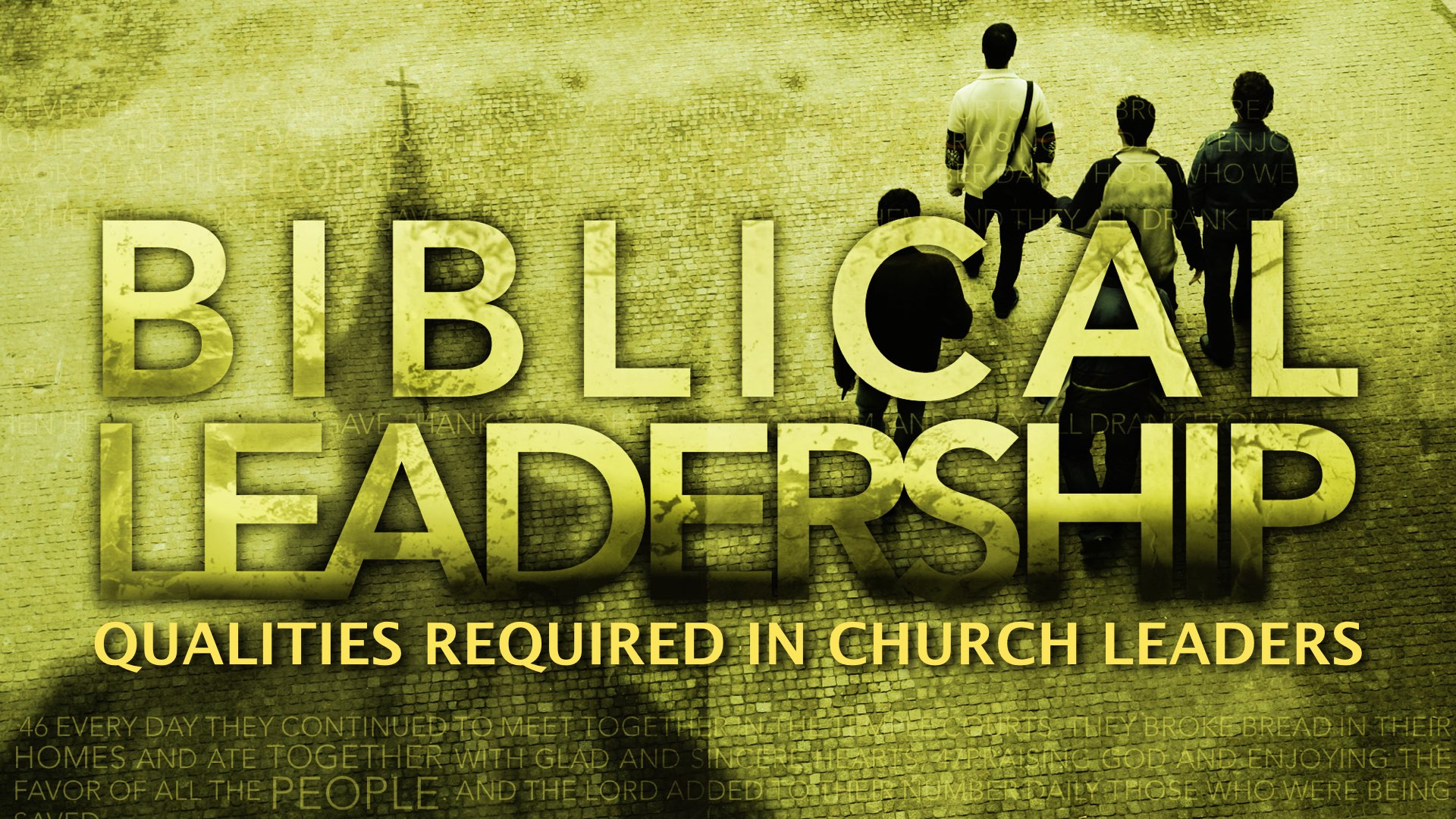Qualities Required in Church Leaders
“People do not usually rise above their leaders.” That is very true.
The character and effectiveness of any church is directly related to the quality of its leadership. Refusal to adhere to biblical standards for leadership are the cause of many of the problems in the church today. In fact that is why the charge is often heard, “There are hypocrites in the church.”
Every leader has the power to influence others for good or evil through his example (4:12; I Pt. 5:3). When a church leader does not live according to the standard God sets out, the Faith is undermined.
I read a report this week that said the pool at the bottom of the Kariba Dam is tens of meters deeper than it should be. The water pouring out of the spillway is threatening to undermine Kariba and the fear is that if not corrected one day the dam will collapse.
When the church accepts leaders who do not meet God’s qualifications, the Christian faith is undermined in the minds of immature Christians and before an unbelieving world.
Our talk and our walk should match! I heard this saying as a kid and it has stuck with me: “Your walk, talks and your talk, talks; but your walk talks louder than your talk, talks.”
In 1 Timothy 3:1-13 Paul is writing to Timothy, a young pastor at the church of Ephesus because men who were unqualified had found their way into church leadership (1:3, 4:1-3). Some were women (2:12) others were guilty of sin and needed public rebuke (5:20, Acts 20:29-30).
Some Helpful Definitions: Biblical church leadership terms defined: (Elder v.1-7; Deacon v.8-13)
Office of Elder: Three terms for the same office:
- Bishop – gr. Episkopos = Overseer, responsible for the spiritual well-being of the church (Phil 1:1, Titus 1:7)
- Elder – gr. Presbuteros = Authority, to teach and rule (I Tim 5:17, Titus 1:5,7)
- Pastor – gr. Poimen = Shepherd, to lead, guide, provide (I Pt 5:2, Acts 20:28)
Office of Deacon:
Deacon – gr. Diakonos = Minister, emphasizes the attitude of a servant. (12)
God requires church leaders to model a high standard of godliness. That is why I Timothy 3 does not list qualifications typical of today’s corporate leaders: Diligence, foresight, vision, administrative skills, decisiveness, courage, humor, eloquence, friendliness, tact, diplomacy etc.
The qualifications for church leaders deal with character, not gifts and abilities. Someone has said that “Character is what you are when no one is looking.”
The Ephesian church needed to examine its leaders and God gave specific specific qualities to look for. The main characteristic of all of these qualities is BLAMELESSNESS (2)
- “He must be blameless” – This means there is nothing to accuse him of. If a malicious charge were to be made, those who know his character would consider the charge absolutely unbelievable. The blameless Pastor is an example for the congregation to follow. (Phil. 3:17)
- He must be above reproach. This speaks of integrity or innocence. It means that the Pastor is not hypocritical but sincere (Mt. 23:13-15).
Now let’s be very clear, God does not have a double standard, he requires all disciples to live blameless lives. However, a pastor or deacon must be blameless or he is not qualified to serve in the office.
CHURCH LEADERS MUST HAVE BLAMELESS CHARACTER (2-3, I Co. 9:27)
He must be sexually pure (2,12)
Husband of one wife – Lit. “one-woman-man”. This is a man who is devoted in heart and mind to the woman who is his wife. He loves, desires and thinks only of her. By implication, he must not be divorced and remarried, or have more than one wife.
Husband of one wife is not speaking of the death of a spouse and then remarriage (1 Co.7:39), nor is it teaching that a pastor must be married, Paul was not married (1 Co. 7:8).
Paul makes a connection that a man’s ability to manage his own home and marriage indicate ability to oversee a local church.
He must be temperate / sober-minded (2)
Not given to excesses. This speaks of a state of mind which is free from the excessive indulgence of passion, lust, or emotion. He is able to keep his head in all situations.
The word temperate is “Nephalios” which literally means wineless or unmixed with wine. It implies being watchful, clear-headed. A church leader must posses inner strength to refrain from any excess that would dull his alertness.
William Hendriksen comments,
“Such a person lives deeply. His pleasures are not primarily those of the senses, like the pleasures of a drunkard for instance, but those of the soul. He is filled with spiritual and moral earnestness. He is not given to excess, but is moderate, well-balanced, calm, careful, steady, and sane. This pertains to his physical, moral, and mental tastes and habits.”
He must be prudent / self-controlled (2)
A church leader is a man who is well disciplined, he is able to order his priorities. He has a serious attitude about his work. Does not cheapen the ministry or the gospel by foolish behavior, inappropriate humor, poor judgement or patterns of wrong thinking (Phil 4:8).
He is respectable (2)
He is a man who is well organized in his thinking, teaching and living. The opposite of this idea is “chaos”.
He is hospitable (I Pt. 4:9; Ro. 12:13)
He is a man who loves strangers. He is friendly and kind to strangers (Lk. 14:12-14). A church leader must not be unapproachable or isolated from his people. His home is a tool for God’s service. His availability makes it possible for his people to see his true character as he interacts with the various aspects of life and ministry both inside and outside the home.
He is able to teach (2, Ro. 12:7)
Dr. Howard Hendricks used to say, “It is a sin to bore people with the Word or God!” A Pastor must have the gift of teaching, to explain and apply the Word of God in a way that connects with the head and heart of the hearer.
This is the one qualification that distinguishes a Pastor and a Deacon. A deacon does not have to have the gift of teaching. He is skilled in communicating Christian teaching. (II Ti. 2:2).
He is not a drunkard (3,8)
Not “one who drinks”. This was especially important in the Ephesian culture! Alcohol was frequently a part of their pagan worship and dominated ancient Greek culture. Drunken orgies were a means of bringing the worshipper in contact with the deity. A church leader is to stay away from anything that hints of this lifestyle!
The work used here is “parinos” and refers to a person’s associations and thus his reputation. Paul is saying that a Pastor is not someone who frequents bars and taverns. He is not at home in the noisy scenes associated with drinking. His lifestyle is not that of a drinker.
Th principle that governs us in this is found in I Co. 10:31 – “Whether therefore you eat or drink or whatever you do, do all to the glory of God.”
Spiritual leaders must stay away from anything that distorts their judgment or distracts from their testimony.
He is not Violent – not a fighter (3)
This speaks of physical violence and verbal violence (1 Ti. 6:4-5). He does not go around looking for a fight. CH Spurgeon commented to his pastoral students, “Don’t go about the world with your fist doubled up for fighting, carrying a theological revolver in the leg of your trousers.”
So let’s pause here to evaluate our own Christian walk as a disciple of Jesus Christ. How does your life relate and match up to these first eight qualities that God is working into every one of His followers?
Are you walking in sexual purity in your head and in your heart? Are you sober-minded, self-controlled, well-organized, and hospitable? Do you stay away from the lifestyle of the drunkard? Do you refrain from physical and verbal abuse?
In our personal evaluation we are likely to see one or two areas where there is need for God’s gracious work. The change or growth required is possible through the inner working of God’s powerful Spirit!
Take a moment to talk with God and seek His help in shaping your character into His image.
Download pdf Qualities Required In Church Leaders
(I am particularly appreciative to Dr. John MacArthur and his 1 Timothy commentary on this text. The MacArthur commentary series is user friendly and often devotional. If you can acquire it you will be blessed.)

